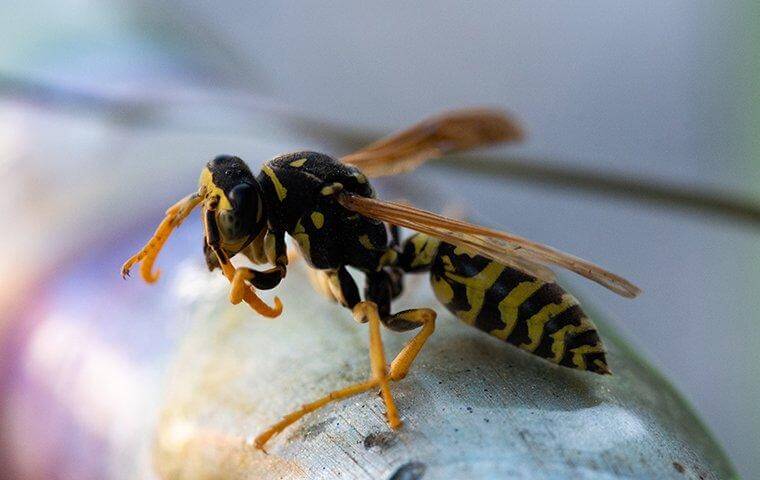 There are many reasons you might want wasps flying around in your yard. Do you know that wasps help to control pests? While they are certainly no replacement for routine visits from a licensed (human) pest control technician, having wasps around can help to reduce pest populations around your home. Wasps also assist with pollination. It is good to have visits from your friendly, neighborhood wasps. But wasps can present a problem if they're given a reason to hang around. Here are seven easy and effective wasp control tips that will help you reduce wasp activity and help you avoid being stung.
There are many reasons you might want wasps flying around in your yard. Do you know that wasps help to control pests? While they are certainly no replacement for routine visits from a licensed (human) pest control technician, having wasps around can help to reduce pest populations around your home. Wasps also assist with pollination. It is good to have visits from your friendly, neighborhood wasps. But wasps can present a problem if they're given a reason to hang around. Here are seven easy and effective wasp control tips that will help you reduce wasp activity and help you avoid being stung.
1. Reduce Smells
There are many smells that can attract the attention of a wasp. If you reduce or eliminate smells, you can avoid unwanted attention.
- Keep your trash in covered containers and clean your containers routinely.
- Keep food covered or inside sealed containers during cookouts.
- Refrain from wearing cologne or perfume while in your yard.
- Move flowers away from outdoor recreational areas.
- Refrain from feeding pets outside, or put food down only during mealtimes.
2. Fill In Ground Holes
Yellow jackets commonly use ground holes to establish nests. These can be troublesome because the vibration of a lawnmower can set those wasps off.
- Fill holes in as soon as you can.
- If you have a ground pest, like a gopher or mole, take care of that pest problem quickly.
3. Reduce Moisture
If you have standing water or high moisture near your home, it can attract the bugs that wasps eat. When you take measures to reduce bugs, you also reduce wasp activity.
- Clean your gutters.
- Trim tree canopy to allow sunlight in.
- Fix plumbing leaks.
4. Seal Entry Points
If wasps come near your home, it is important that they don't find a way inside. There are many ways wasps can get into your home.
- Repair window and door screens.
- Repair damaged window panes.
- Seal gaps around windows and doors.
- Seal gaps around pipes and other penetrations.
- Keep exterior doors open only as long as necessary.
5. Be Cautious
Keep a wary eye out for wasps. If you see a wasp, move away quickly, without swinging your arms. This can prevent the wasp from becoming aggressive. Some areas to be cautious are:
- When you go out onto a balcony.
- When you are on your porch or deck.
- When you are picking fruit or vegetables.
- Before you trim hedges or bushes.
- When you mow near a ground hole.
6. Routine Inspections
It is always good to be cautious in your yard and to be aware of your surroundings. You never know when you'll accidentally come in close contact with a wasp. But you should also take time to do an inspection of your yard every couple of weeks. This can alert you to a problem before you run headfirst into it.
- Inspect all rooflines
- Examine roofs and rafters
- Check playground equipment
- Check objects sitting in your yard
- Look for holes in the ground that have wasp activity
- Listen for buzzing
7. Residential Pest Control
When you have routine visits from a pest control technician, wasps will be addressed quickly, and you're far less likely to run into an aggressive wasp. Why? Because wasps are more aggressive near their nests. This is due to a nest-protection instinct. Technicians locate and remove nests before you stumble onto a wasp (of dozens of wasps) that feel threatened by your presence.
Philadelphia Wasp Control
Pestmaster® Services provides the highest level of pest control in the Philadelphia area. We can help you protect yourself and those you love from wasp stings by providing proactive wasp nest detection and removal as a part of your residential pest control plan. Connect with us today and get your protection in place.
.png)
